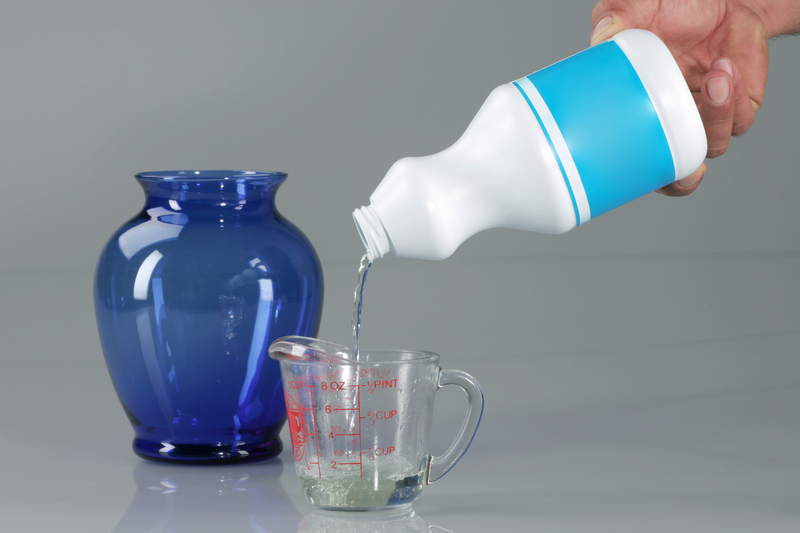Secure Your Deposit: End of Tenancy Cleaning for Tenants
Posted on 26/09/2025
Secure Your Deposit: End of Tenancy Cleaning for Tenants
Moving out of a rental property can be both exciting and overwhelming. One aspect that is often underestimated by tenants is the importance of a thorough end of tenancy cleaning. In most cases, landlords expect the rental home to be returned in a condition that matches or surpasses its state at the start of the tenancy. Failure to meet these expectations can result in partial or total loss of your security deposit. This article will provide in-depth guidance and actionable tips to help tenants secure their deposit by mastering the art of end of tenancy cleaning.

Understanding End of Tenancy Cleaning and Its Importance
What is End of Tenancy Cleaning?
End of tenancy cleaning refers to the deep and detailed cleaning of a rental property before moving out. It goes beyond regular household cleaning and focuses on restoring the property to its original or agreed standard as per the rental agreement. This process is designed to satisfy landlords or letting agents who will conduct inspections before returning your deposit.
Why Is End of Tenancy Cleaning Essential for Tenants?
- Deposit Recovery: The most crucial reason is to secure your full deposit. Unclean areas can serve as grounds for deductions.
- Contractual Obligation: Most tenancy agreements require the property to be left in a clean, presentable state.
- Reference for Future Rentals: Leaving the property clean ensures positive feedback from landlords, which is beneficial for future rentals.
- Legal Requirement: In some jurisdictions, cleanliness at check-out is part of legal regulations governing rentals.
Neglecting the end of tenancy cleaning process can cost you more than money. It can also tarnish your reputation as a reliable tenant.
Common Reasons for Deposit Deductions Due to Cleaning
According to tenancy deposit schemes and survey data, cleaning is the top reason cited for deposit disputes. Understanding these common pitfalls can help you avoid them:
- Dirty kitchens and appliances (especially ovens and fridges)
- Stained carpets or flooring
- Mold and mildew in bathrooms
- Accumulated dust and cobwebs
- Neglected windows and sills
- Overflowing bins or left-behind rubbish
By addressing each of these key areas, tenants can greatly increase their chances to secure their deposit.
Preparing for End of Tenancy Cleaning: Your Ultimate Checklist
Step 1: Read Your Tenancy Agreement Thoroughly
Before you start, carefully review your tenancy contract. It often outlines specific cleaning expectations, such as professional carpet cleaning, treating mould, or cleaning windows inside and out. Understanding these requirements is the first and most important step to securing your deposit.
Step 2: Gather Cleaning Supplies
Equip yourself with effective cleaning products and tools. Essentials include:
- Multi-purpose and anti-bacterial cleaners
- Degreaser for kitchen appliances
- Glass cleaner for windows and mirrors
- Descaler for bathrooms
- Sponges, microfibre cloths, and scrubbing brushes
- Vacuum cleaner with attachments
- Mop and bucket
- Rubber gloves
- Garbage bags
Having the right supplies on hand is crucial for an efficient and comprehensive cleaning process.
Step 3: Plan and Organize Your Cleaning
- Start Early: Allocate enough time, depending on the size and condition of the property.
- Declutter: Remove all personal belongings and rubbish before cleaning.
- Work Room by Room: Focus on one area at a time for a thorough finish.
- Check Off as You Go: Use a printable checklist to keep track of completed tasks.
A structured approach not only saves time but also ensures that nothing is missed during the end of tenancy cleaning process.
Essential End of Tenancy Cleaning Tips for Every Room
Kitchen Cleaning Tips
- Appliances: Defrost and clean the fridge/freezer. Remove all food, wipe interiors, doors, and handles. Deep clean the oven and hob - use specialized cleaners, remove grease and burned-on residues.
- Surfaces: Clean all countertops, tiles, and splashbacks. Don't overlook wall spots or grouting stains.
- Cupboards: Empty and clean cupboard interiors and exteriors. Check for crumbs and grease.
- Sink: Scrub with descaler and disinfectants to remove limescale and stains.
- Floor: Sweep and mop, paying attention to corners and under appliances.
Bathroom Cleaning Tips
- Limescale: Remove build-up from taps, showers, bath, and plugholes.
- Toilet: Use specialist cleaners for inside and outside the bowl, including the flush mechanisms.
- Tiles, Glass, and Mirrors: Clean with streak-free products, wipe away watermarks and residue.
- Sink, Bath, and Shower: Disinfect and scrub thoroughly, dealing with soap scum and mildew.
- Flooring: Mop and ensure grouting is free from mold.
Living Areas and Bedrooms Cleaning Tips
- Carpets: Vacuum with precision. Consider steam cleaning if there are tough stains or if the tenancy agreement requires it.
- Furniture: Dust and wipe all furniture, including underneath cushions or drawers.
- Walls: Remove any marks, blu-tack, nails, or hooks. Do gentle spot cleaning where necessary.
- Windows: Clean inside (and outside if expected), including sills, tracks, and frames.
- Curtains and Blinds: Dust, decode, or launder as needed.
- Cobwebs and Dust: Address all corners and light fixtures.
General Property Areas
- Entrances and Hallways: Sweep, mop, and dust skirting boards, doors, and handles.
- Outdoor Areas: Check balconies, patios, or gardens for rubbish and debris, sweep if needed.
- Bins: Empty and disinfect all indoor and outdoor bins.
Final tip: Double-check every room after completion. Freshen the air and leave windows open to ventilate the property prior to inspection.
Professional End of Tenancy Cleaning vs. DIY: Which is Right for You?
DIY Cleaning
Many tenants choose to handle the cleaning themselves to save on costs. With careful planning, the right tools, and reference to a comprehensive checklist, DIY end of tenancy cleaning can deliver great results. Advantages include:
- Cost-effective
- Personal control over the process
- Ability to work according to your timeline
However, DIY cleaning requires significant effort and time. You might also need to rent steam cleaners for carpets or specialized equipment for ovens, which can affect your budget.
Hiring Professional End of Tenancy Cleaners
Some tenancy contracts specifically require professional end of tenancy cleaning, especially for carpets or if pets have lived in the property. The key benefits are:
- Comprehensive, top-to-bottom cleaning by experienced staff
- Efficient work within a short timeframe
- Use of professional, often industrial-grade, cleaning equipment
- Receipt/proof of a professional service for your landlord or letting agent
- Reduces the risk of disputes and increases the likelihood to get your full deposit back
While more expensive, hiring professionals can be a worthwhile investment in securing your deposit, especially for larger properties or if deep stains/dirt are present.
Frequently Overlooked Cleaning Tasks That May Cost You Your Deposit
- Light fixtures and light bulbs - Dust and wipe every fitting
- Extractor fans - Clean built-up grease from filters
- Radiators and behind radiators - Dust and wipe thoroughly
- Skirting boards and door frames - Wipe down fully
- Garage, storage sheds, and attic spaces - Remove all belongings and vacuum/sweep
- Meters and fuse boxes - Gently dust and wipe
- Pipes and plumbing - Remove limescale and dust
Overlooking these areas is a common reason for post-inspection cleaning deductions, so ensure you add them to your checklist!
Expert Advice on Avoiding End of Tenancy Cleaning Disputes
- Take photos when moving in and out for accurate condition records
- Communicate with your landlord/agent before moving out about their expectations
- Request the landlord's cleaning checklist if they use one
- Leave receipts for professional cleaning jobs for proof, if applicable
- Book the final check-out inventory inspection when you're present so you can address any issues in real-time
Proper documentation is often the key to getting your deposit back without conflict.

Frequently Asked Questions: End of Tenancy Cleaning for Tenants
Do I need to hire a professional cleaning service?
Not always. Check your tenancy agreement - it will tell you if professional cleaning is a requirement. If not mandatory, a thorough DIY clean is usually sufficient. However, professional services may be needed for bad stains or if you lack the time/equipment for a deep clean.
What happens if my landlord is not satisfied with the cleaning?
If the property fails to meet the required standard, landlords can withhold part of your deposit to cover cleaning costs. They should provide an itemized list of deductions and allow you to address any issues before finalizing the settlement.
How can I prove I cleaned the property thoroughly?
- Keep before-and-after photos as evidence
- Retain receipts for professional services
- Cross-reference your cleaning checklist with the check-out inventory
How far in advance should I schedule end of tenancy cleaning?
Begin cleaning once all your possessions have been removed. If booking professionals, schedule at least one week before the final inspection to allow time for re-cleaning if necessary.
Summary: Protecting Your Deposit with Professional End of Tenancy Cleaning
End of tenancy cleaning is a critical responsibility for every tenant aiming to secure their security deposit. Whether you choose a DIY approach or hire professional end of tenancy cleaners, attention to detail and thoroughness are essential. By following this guide, addressing every area of your rental property, and documenting your efforts, you ensure a smooth move-out process and maximize your chances of deposit recovery. Remember, an immaculately cleaned property benefits your finances and sets a positive record for your future as a tenant.
Ready to secure your deposit? Follow this comprehensive end of tenancy cleaning checklist and leave your rental spotless for a stress-free move-out experience!


